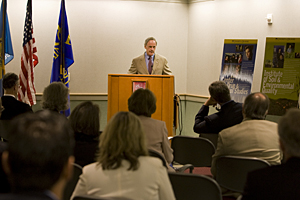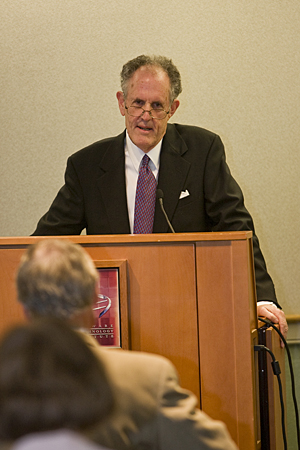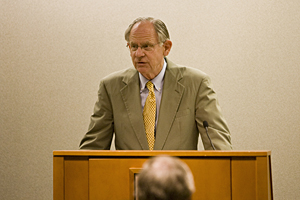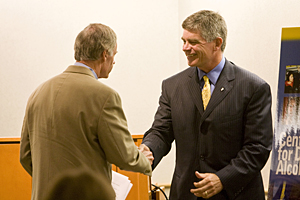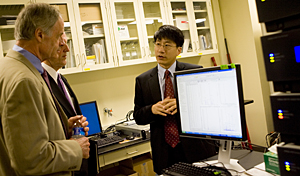
- Rozovsky wins prestigious NSF Early Career Award
- UD students meet alumni, experience 'closing bell' at NYSE
- Newark Police seek assistance in identifying suspects in robbery
- Rivlin says bipartisan budget action, stronger budget rules key to reversing debt
- Stink bugs shouldn't pose problem until late summer
- Gao to honor Placido Domingo in Washington performance
- Adopt-A-Highway project keeps Lewes road clean
- WVUD's Radiothon fundraiser runs April 1-10
- W.D. Snodgrass Symposium to honor Pulitzer winner
- New guide helps cancer patients manage symptoms
- UD in the News, March 25, 2011
- For the Record, March 25, 2011
- Public opinion expert discusses world views of U.S. in Global Agenda series
- Congressional delegation, dean laud Center for Community Research and Service program
- Center for Political Communication sets symposium on politics, entertainment
- Students work to raise funds, awareness of domestic violence
- Equestrian team wins regional championship in Western riding
- Markell, Harker stress importance of agriculture to Delaware's economy
- Carol A. Ammon MBA Case Competition winners announced
- Prof presents blood-clotting studies at Gordon Research Conference
- Sexual Assault Awareness Month events, programs announced
- Stay connected with Sea Grant, CEOE e-newsletter
- A message to UD regarding the tragedy in Japan
- More News >>
- March 31-May 14: REP stages Neil Simon's 'The Good Doctor'
- April 2: Newark plans annual 'wine and dine'
- April 5: Expert perspective on U.S. health care
- April 5: Comedian Ace Guillen to visit Scrounge
- April 6, May 4: School of Nursing sponsors research lecture series
- April 6-May 4: Confucius Institute presents Chinese Film Series on Wednesdays
- April 6: IPCC's Pachauri to discuss sustainable development in DENIN Dialogue Series
- April 7: 'WVUDstock' radiothon concert announced
- April 8: English Language Institute presents 'Arts in Translation'
- April 9: Green and Healthy Living Expo planned at The Bob
- April 9: Center for Political Communication to host Onion editor
- April 10: Alumni Easter Egg-stravaganza planned
- April 11: CDS session to focus on visual assistive technologies
- April 12: T.J. Stiles to speak at UDLA annual dinner
- April 15, 16: Annual UD push lawnmower tune-up scheduled
- April 15, 16: Master Players series presents iMusic 4, China Magpie
- April 15, 16: Delaware Symphony, UD chorus to perform Mahler work
- April 18: Former NFL Coach Bill Cowher featured in UD Speaks
- April 21-24: Sesame Street Live brings Elmo and friends to The Bob
- April 30: Save the date for Ag Day 2011 at UD
- April 30: Symposium to consider 'Frontiers at the Chemistry-Biology Interface'
- April 30-May 1: Relay for Life set at Delaware Field House
- May 4: Delaware Membrane Protein Symposium announced
- May 5: Northwestern University's Leon Keer to deliver Kerr lecture
- May 7: Women's volleyball team to host second annual Spring Fling
- Through May 3: SPPA announces speakers for 10th annual lecture series
- Through May 4: Global Agenda sees U.S. through others' eyes; World Bank president to speak
- Through May 4: 'Research on Race, Ethnicity, Culture' topic of series
- Through May 9: Black American Studies announces lecture series
- Through May 11: 'Challenges in Jewish Culture' lecture series announced
- Through May 11: Area Studies research featured in speaker series
- Through June 5: 'Andy Warhol: Behind the Camera' on view in Old College Gallery
- Through July 15: 'Bodyscapes' on view at Mechanical Hall Gallery
- More What's Happening >>
- UD calendar >>
- Middle States evaluation team on campus April 5
- Phipps named HR Liaison of the Quarter
- Senior wins iPad for participating in assessment study
- April 19: Procurement Services schedules information sessions
- UD Bookstore announces spring break hours
- HealthyU Wellness Program encourages employees to 'Step into Spring'
- April 8-29: Faculty roundtable series considers student engagement
- GRE is changing; learn more at April 15 info session
- April 30: UD Evening with Blue Rocks set for employees
- Morris Library to be open 24/7 during final exams
- More Campus FYI >>
1:59 p.m., July 20, 2009----The path to job creation is through leading-edge science, according to Delaware's Congressional delegation, which announced $1.2 million in federal funding to the University of Delaware on Monday, July 20, at a press conference at the Delaware Biotechnology Institute.
The funding, through the Omnibus Appropriations Act of 2009, will support research in environmental science, avian influenza, biomedicine, and substance abuse.
Specifically, the federal dollars will provide facilities upgrades for avian influenza monitoring critical to the state's poultry industry, programs and equipment for “critical zone” research on soil and environmental quality, infrastructure for cancer and neuroscience research, an expansion of the Delaware School Survey project to assess prescription drug use among teens, and a satellite receiving station at the Hugh R. Sharp Campus in Lewes for accessing real-time data on the Delaware Bay corridor.
The funded programs directly involve five of the University's seven colleges and have interdisciplinary implications for all seven, according to University President Patrick Harker.
“That's important to us because this kind of collaboration isn't just the way of the future; it's how the University of Delaware is doing business today,” Harker noted.
Senator Thomas Carper, who also is a UD alumnus, talked about the genesis nearly a decade ago of the Delaware Biotechnology Institute, an interdisciplinary center for life sciences research at the University, and its rapid evolution as “one of the principal economic engines in the State of Delaware.”
Nearly 12,000 new primary and secondary jobs have been created since the Delaware Biotechnology Institute opened in 2001.
“With some of the work we're doing here at the University of Delaware, we're addressing problems facing the state and the world,” Carper noted.
During his remarks, Senator Ted Kaufman noted that when he came to the state in 1966, Delaware was the nation's leader in science.
“It's really important that we get back to being the science capital again,” Kaufman said.
Kaufman, who is the only engineer in the U.S. Senate, praised the University for expanding its engineering curriculum and noted that there are “incredible opportunities” for students in science, technology, engineering, and mathematics and fields like biotechnology that bring all of those disciplines together.
“Not all jobs are created equal,” he said. “We want to get these high-tech jobs.”
Representative Michael Castle praised Harker, noting: “The University is thriving and doing extraordinarily well under your leadership.”
He said of the Delaware Biotechnology Institute and the University's larger research programs, “There's a lot of scientific interest here and we need to develop it in every way we can for the benefit of our community.”
The funding supports the following UD research projects:
Avian Influenza Preparedness: $94,000 to upgrade Delmarva's avian flu diagnostic and biocontainment facilities and to foster the continued development of an integrated Delmarva Poultry Diagnostic Laboratory System, a nationwide model for interstate cooperation.
The University's avian influenza testing capability and research programs in the College of Agriculture and Natural Resources are central to the protection of Delmarva's multibillion-dollar poultry industry. The programs are led by Jack Gelb, director of UD's Avian Biosciences Center, and chairperson of the Department of Animal and Food Sciences.
Center for Critical Zone Research-Institute of Soil and Environmental Quality: $70,000 to support programs and acquire equipment essential to critical zone research, which focuses on the complex processes occurring between the treetops to the groundwater.
The Institute of Soil and Environmental Quality, led by Tom Sims, T. A. Baker Professor of Soil and Environmental Chemistry, is a center of excellence for research, education, and outreach programs that provide science-based solutions to soil and environmental problems.
The Center for Critical Zone Research, under the direction of Donald Sparks, S. Hallock duPont Chair of Plant and Soil Sciences, conducts leading-edge research on the Earth's life-sustaining, near-surface environment.
Center for Drug & Alcohol Studies: $65,000 to supplement the Delaware School Survey Project to provide special analyses of juvenile substance use, violence, and delinquency, with a focus on prescription drug abuse. The project is led by associate scientist Roberta Gealt and senior scientist Steve Martin.
The center conducts research on substance abuse among hard-to-reach populations of youth and adults. It provides both a national research focus, as well as service to the state of Delaware. James Inciardi and Christine Visher are co-directors of the center, which is based in the College of Arts and Sciences.
Delaware Biotechnology Institute: $190,000 to strengthen Delaware's biomedical research capabilities by building on existing programs in cancer research and bioinformatics, and building new infrastructure in cardiovascular and neuroscience research. The research includes investigators in the colleges of Health Sciences, Arts and Sciences, and Engineering.
Founded in 2001, the Delaware Biotechnology Institute is a major center for life sciences research at UD, focusing on human health, agriculture, and the environment. Kelvin Lee, Gore Professor of Chemical Engineering, serves as its director.
Real-Time Satellite Receiving Station: $750,000 for a real-time satellite receiving station at the University's Hugh R. Sharp Campus in Lewes. Such a station is important for accessing real-time data for University of Delaware researchers looking at regional issues associated with watersheds, shoreline erosion, and the land-sea interface. The project is led by Xiao-Hai Yan, Mary A. S. Lighthipe Professor of Oceanography and co-director of the Center for Remote Sensing, and Matt Oliver, assistant professor of oceanography, in the College of Earth, Ocean, and Environment.
Article by Tracey Bryant
Photos by Ambre Alexander



